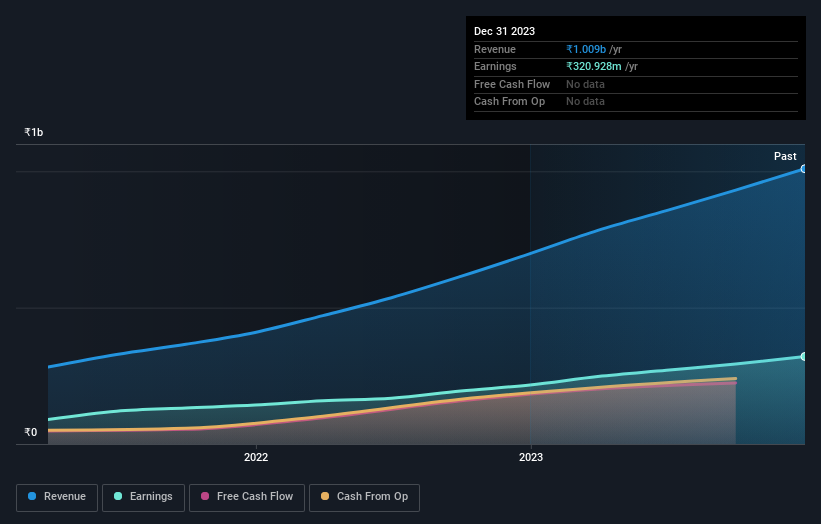Following recent decline, Ksolves India Limited's (NSE:KSOLVES) top shareholder CEO Ratan Srivastava sees holdings value drop by 15%
Key Insights
- Ksolves India's significant insider ownership suggests inherent interests in company's expansion
- A total of 2 investors have a majority stake in the company with 59% ownership
- Ownership research, combined with past performance data can help provide a good understanding of opportunities in a stock
If you want to know who really controls Ksolves India Limited (NSE:KSOLVES), then you'll have to look at the makeup of its share registry. We can see that individual insiders own the lion's share in the company with 66% ownership. That is, the group stands to benefit the most if the stock rises (or lose the most if there is a downturn).
And last week, insiders endured the biggest losses as the stock fell by 15%.
Let's delve deeper into each type of owner of Ksolves India, beginning with the chart below.
See our latest analysis for Ksolves India

What Does The Lack Of Institutional Ownership Tell Us About Ksolves India?
Small companies that are not very actively traded often lack institutional investors, but it's less common to see large companies without them.
There could be various reasons why no institutions own shares in a company. Typically, small, newly listed companies don't attract much attention from fund managers, because it would not be possible for large fund managers to build a meaningful position in the company. It is also possible that fund managers don't own the stock because they aren't convinced it will perform well. Ksolves India's earnings and revenue track record (below) may not be compelling to institutional investors -- or they simply might not have looked at the business closely.

Ksolves India is not owned by hedge funds. The company's CEO Ratan Srivastava is the largest shareholder with 32% of shares outstanding. For context, the second largest shareholder holds about 27% of the shares outstanding, followed by an ownership of 5.3% by the third-largest shareholder. Interestingly, the second-largest shareholder, Deepali Verma is also Senior Key Executive, again, pointing towards strong insider ownership amongst the company's top shareholders.
After doing some more digging, we found that the top 2 shareholders collectively control more than half of the company's shares, implying that they have considerable power to influence the company's decisions.
While it makes sense to study institutional ownership data for a company, it also makes sense to study analyst sentiments to know which way the wind is blowing. As far as we can tell there isn't analyst coverage of the company, so it is probably flying under the radar.
Insider Ownership Of Ksolves India
The definition of company insiders can be subjective and does vary between jurisdictions. Our data reflects individual insiders, capturing board members at the very least. Management ultimately answers to the board. However, it is not uncommon for managers to be executive board members, especially if they are a founder or the CEO.
Most consider insider ownership a positive because it can indicate the board is well aligned with other shareholders. However, on some occasions too much power is concentrated within this group.
Our information suggests that insiders own more than half of Ksolves India Limited. This gives them effective control of the company. Given it has a market cap of ₹12b, that means they have ₹8.2b worth of shares. Most would argue this is a positive, showing strong alignment with shareholders. You can click here to see if those insiders have been buying or selling.
General Public Ownership
With a 34% ownership, the general public, mostly comprising of individual investors, have some degree of sway over Ksolves India. While this group can't necessarily call the shots, it can certainly have a real influence on how the company is run.
Next Steps:
It's always worth thinking about the different groups who own shares in a company. But to understand Ksolves India better, we need to consider many other factors. For instance, we've identified 1 warning sign for Ksolves India that you should be aware of.
Of course, you might find a fantastic investment by looking elsewhere. So take a peek at this free list of interesting companies.
NB: Figures in this article are calculated using data from the last twelve months, which refer to the 12-month period ending on the last date of the month the financial statement is dated. This may not be consistent with full year annual report figures.
Valuation is complex, but we're here to simplify it.
Discover if Ksolves India might be undervalued or overvalued with our detailed analysis, featuring fair value estimates, potential risks, dividends, insider trades, and its financial condition.
Access Free AnalysisHave feedback on this article? Concerned about the content? Get in touch with us directly. Alternatively, email editorial-team (at) simplywallst.com.
This article by Simply Wall St is general in nature. We provide commentary based on historical data and analyst forecasts only using an unbiased methodology and our articles are not intended to be financial advice. It does not constitute a recommendation to buy or sell any stock, and does not take account of your objectives, or your financial situation. We aim to bring you long-term focused analysis driven by fundamental data. Note that our analysis may not factor in the latest price-sensitive company announcements or qualitative material. Simply Wall St has no position in any stocks mentioned.
About NSEI:KSOLVES
Ksolves India
Provides software development services India and internationally.
Excellent balance sheet with acceptable track record.
Similar Companies
Market Insights
Weekly Picks


The Future of Social Sharing Is Private and People Are Ready


EU#3 - From Philips Management Buyout to Europe’s Biggest Company

Booking Holdings: Why Ground-Level Travel Trends Still Favor the Platform Giants


A fully integrated LNG business seems to be ignored by the market.
Recently Updated Narratives


#1 Silver Play with Positive Cashflow Gold Miner (Top Notch Team)


Near-Restart Producer Mexico Silver Miner


Nevada 1st-Tier 30 Baggers Silver Play Potential
Popular Narratives


The "Sleeping Giant" Stumbles, Then Wakes Up

Undervalued Key Player in Magnets/Rare Earth


NVDA: Expanding AI Demand Will Drive Major Data Center Investments Through 2026
Trending Discussion


I wrote the latest analysis on DSV, all I can say this is my #1 stock pick, my largest hold. Latest : https://simplywall.st/community/narratives/ca/materials/tsx-dsv/discovery-silver-shares/ha9axhmi-1-silver-play-with-positive-cashflow-gold-miner-top-notch-team-moui/updates/5-discovery-silver-corp-tsx-dsv-discovery-silver-is-now?utm_source=share&utm_medium=web




